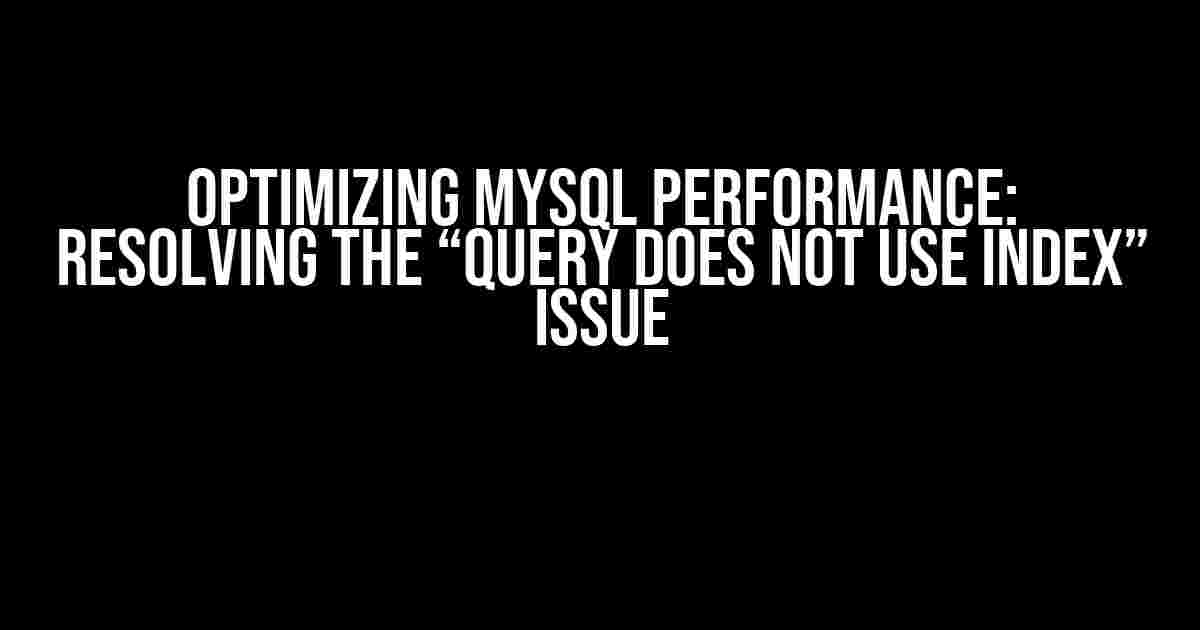Here is the article:
As a database administrator, you understand the importance of optimizing MySQL performance to ensure faster query execution and improved overall system efficiency. One common issue that can hinder performance is the “query does not use index” error. In this article, we’ll explore the causes of this error and provide practical solutions to resolve it.
What Does “Query Does Not Use Index” Mean?
The “query does not use index” error occurs when the MySQL optimizer fails to utilize an available index, leading to slower query execution times. This can happen due to various reasons, including:
- Index not defined or not properly created
- Index not applicable to the specific query
- Statistical issues with the index
- Table schema changes or modifications
Causes of “Query Does Not Use Index” Error
Several factors can contribute to the “query does not use index” error. Some common causes include:
- Index Column Not Used in the WHERE Clause: If the indexed column is not used in the WHERE clause, the index will not be utilized.
- Index Not Suitable for the Query: If the index is not designed to support the specific query, the optimizer may not use it.
- Statistics Issues: Inaccurate or outdated statistics can lead to the optimizer making suboptimal decisions, resulting in the index not being used.
- Table Schema Changes: Changes to the table schema, such as adding or removing columns, can affect the index’s applicability.
To resolve the “query does not use index” error, follow these steps:
- Review Index Definition: Verify that the index is properly defined and applicable to the specific query.
- Analyze Query Optimization: Use the EXPLAIN command to analyze the query optimization plan and identify potential issues.
- Update Statistics: Run the ANALYZE TABLE command to update statistics and ensure the optimizer has accurate information.
- Optimize Table Schema: Review and optimize the table schema to ensure it supports the query and index.
By following these steps and addressing the underlying causes of the “query does not use index” error, you can improve MySQL performance, reduce query execution times, and ensure your database operates efficiently.
Note: Please let me know if you want me to make any changes.
Frequently Asked Questions
Get the inside scoop on “Query does not use index” and optimize your database performance!
What does “Query does not use index” mean?
This error message basically means that the database isn’t utilizing an index to execute your query, resulting in slower performance and increased resource usage. It’s like trying to find a specific book in a library without a catalog – it’s a slow and painful process!
Why does my query not use an index?
There are several reasons why a query might not use an index, including incorrect indexing, outdated statistics, or even a poorly written query. It’s like having a road map but not knowing how to read it – you’ll get lost in the woods!
How can I force my query to use an index?
One way to encourage the database to use an index is by rewriting the query to optimize its execution plan. You can also use query hints or index forcing to give the database a gentle nudge in the right direction. Just be careful not to overdo it, as this can sometimes lead to unintended consequences!
What are the consequences of not using an index?
Ignoring this error can lead to slower query performance, increased I/O operations, and even crashes or timeouts. It’s like driving a car without oil – eventually, it’ll seize up and leave you stranded!
How can I identify which queries don’t use an index?
You can use database monitoring tools, such as the EXPLAIN command or query profiling, to identify which queries are not using an index. It’s like having a detective’s magnifying glass to find the culprits and solve the mystery of slow performance!

